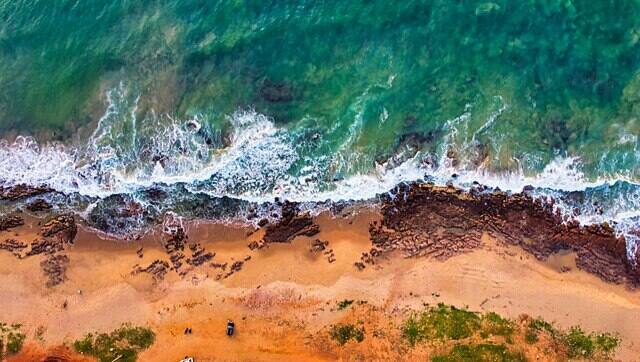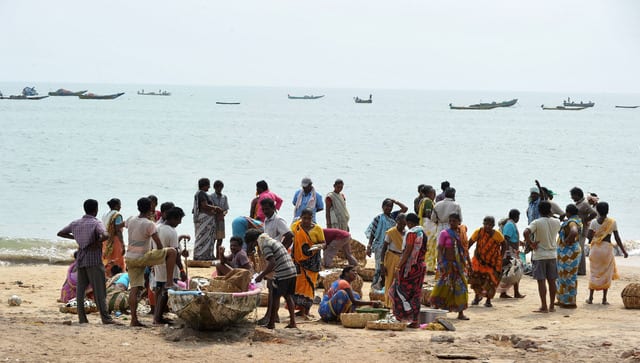Almost echoing the similar line, the Centre for the Blue Economy says, “It is now a widely used term around the world with three related but distinct meanings — the overall contribution of the oceans to economies, the need to address the environmental and ecological sustainability of the oceans, and the ocean economy as a growth opportunity for both developed and developing countries.” The definitions clearly exemplify the writing on the wall and that is acknowledging and practising the ‘sustainability’ in letter and spirit rather merely as keepsake words. While the blue economy comprises a range of economic sectors and related policies that together determine whether the use of ocean resources is sustainable, a major challenge it confronts in understanding and managing the many aspects of oceanic sustainability, ranging from sustainable fisheries to ecosystem health to preventing pollution. Second, as put forward by a finding of the United Nations (UN), “the blue economy challenges us to realise that the sustainable management of ocean resources will require collaboration across borders and sectors through a variety of partnerships, and on a scale that has not been previously achieved. This is a tall order, particularly for Small Island Developing States (SIDS) and Least Developed Countries (LDCs) who face significant limitations.” The UN notes that the blue economy will aid in achieving the UN Sustainable Development Goals (SDGs), of which one goal, 14, is “Life Below Water”. It seeks to conserve and sustainably use the oceans, seas and marine resources for sustainable development. As per Action Group on Sustainable Blue Economy, the worldwide ocean economy is valued at around $1.5 trillion per year, making it the seventh largest economy in the world. It is set to double by 2030 to $3 trillion. The total value of ocean assets (natural capital) has been estimated at $24 trillion. Remarkably, Action Group on Sustainable Blue Economy encourages collaborative efforts among the countries to exchange successful strategies, information, knowledge and best practices; facilitating the deployment of new technologies and innovations to create and drive environmentally-compatible industries; developing the economic empowerment and resilience of communities living around oceans, seas, lakes and rivers; and building economic instruments to leverage environmental protection, such as blue carbon, blue bonds and coastal resilience insurance. A sort of global consensus on the blue economy is aimed for and this is something to be duly taken into the consideration for making a long-term action plan for substantiating the ongoing dialogues and practices in this domain. In the South Asian or global context at large, India is among the most formidable players in the blue economy ecosystem whose action and achievements on the sustainability front are keenly observed, discussed and often emulated as well. With a rich water resources base and marine environment to explore the actual potential, India is just waiting for its moments to broaden the ambit by linking the blue economy framework to the economic growth and environmental sustainability besides serving the national security interests. As finding a sustainable development paradigm is the need of the hour, the blue economy should be seen as a subset of India’s national economy that is making a headway albeit with the challenges of an uncertain global geo-political and economic order. With bright possibilities in India, the blue economy should get a much needed framework for unlocking the potential for inclusive economic growth. To ascertain India’s edge with strong fundamentals that are supportive to the blue economy, knowing a few figures is utmost important. First and foremost, with about 7,500 kilometers of coastline, its maritime position is extremely significant. [caption id=“attachment_10492991” align=“alignnone” width=“640”]  Image Courtesy: Wikimedia Commons[/caption] Out of India’s twenty-nine states, nine states are coastal with 1,382 islands. Reportedly, there are 199 ports including some of the largest in the world that handle enormous amounts of cargo. Spreading in over 2 million square kilometres, India’s Exclusive Economic Zone is rich with crucial resources like crude oil and natural gas. Added to the fact, India has a promising coastal economy that creates livelihood for over four million people from the local communities, especially those that rely on commercial fishing. [caption id=“attachment_10493001” align=“alignnone” width=“640”]  Indian fishermen and women sort fish after returning from a journey in Visakhapatnam. AFP[/caption] As an emerging concept, the blue economy merits to be not presented only as a business model that rests on precisely exploiting the maritime and marine resources like commercial shipping, fishing and mineral development. What is critically important is to emphasise on the holistic vision for the blue economy with an unwavering focus on sustainable economic growth. In a clearer reference, the blue economy can be seen as an extension of the green economy, giving due to the responsibility in commercialising the ocean resources and finally serving the greater common goods by keeping the harmony in development. As the reckoning is, the blue economy creates economic opportunities but equally vital is highlighting its another facet in preserving the ‘blue resources’ — for mitigating the vicious impacts of chronic poverty and climate change. Recently, the Ministry of Earth Sciences (MoES), government of India, has rolled out the Draft Blue Economy policy for India in the public domain inviting suggestions and inputs from various stakeholders including industry, NGOs, academia, and citizens. The draft blue economy policy document outlines the vision and strategy that can be adopted to utilise the abundant oceanic resources available in the country. The policy document has been recently disseminated for public consultation on several outreach platforms by MoES and it is time to discuss the ways to enhance contribution of the blue economy to India’s GDP, improve lives of coastal communities, preserve marine biodiversity, and maintain the national security of marine areas and resources. The MoES prepared the draft blue economy policy framework in line with the Government of India’s vision and highlights the blue economy as one of the ten core dimensions for national growth. India’s vast maritime interests make its tryst with the blue economy uniquely decisive, especially so for economic growth. India’s draft blue economy policy should be debated widely for giving it the required traction to finally be an enabler of a crucial framework that ensures GDP growth as well as welfare of people. The draft policy recognises the blue economy as one of the ten core dimensions for national growth. Noticeably, the draft document focuses on seven thematic areas: National Accounting Framework for the Blue Economy and Ocean Governance; Coastal Marine Spatial Planning and Tourism; Marine Fisheries, Aquaculture & Fish Processing; Manufacturing, Emerging Industries, Trade, Technology, Services and Skill Development; Logistics, Infrastructure and Shipping including Transshipment; Coastal and Deep-sea Mining & Offshore Energy; Security, Strategic Dimensions & International Engagement. It is wishful that the blue economy policy gains the ground and is implemented progressively for positive changes. UN member states, including India, adopted 17 SDGs, also known as the Global Goals, in 2015 as a universal call to take action to end poverty, protect the planet, and ensure that all people enjoy peace and prosperity by 2030. Several countries have undertaken initiatives to harness their blue economy. For instance, Australia, Brazil, United Kingdom, United States, Russia, and Norway have developed dedicated national ocean policies with measurable outcomes and budgetary provisions. Canada and Australia have enacted legislation and established hierarchical institutions at federal and state levels to ensure progress and monitoring of their blue economy targets. With a draft blue economy policy framework of its own, India is now all set to harness the vast potential of its ocean resources. In the post-pandemic times, when the industrial revival depends on a consistent demand push to keep the market fundamentals in order, the newer opportunities including blue economy offer the green shoots for sure. Notwithstanding the unprecedented hardship created by Covid-19 and operational disruptions, the Indian economy has promising prospects beyond short to medium fluctuations. The policies and action combining together can harness a fledgling sector that has potential to give a fresh momentum to the India Growth Story. India, the world’s largest democracy and one of the fastest growing economies, is waiting for the next success story and that possibly may come from the territory of the blue economy. The opening of the new opportunities will revitalise the economic reforms in India as well, lately the realisation should get further firmed up in favour of exploring the actual economic potential India has. Moreover, a cleaner future will also be helpful in bringing the Environmental, Social and Governance (ESG) equation into action where India’s response to the sustainable development needs is closely looked at globally. One stellar show with the blue economy will position India as a hope for the world which otherwise should be in the collective search of finding an alternative development paradigm. Time will tell more about it. The author is a policy professional, columnist and writer with a special focus on South Asia. Views expressed are personal. Read all the Latest News , Trending News , Cricket News , Bollywood News , India News and Entertainment News here. Follow us on Facebook, Twitter and Instagram.
With bright possibilities in India, the blue economy should get a much needed framework for unlocking the potential for inclusive economic growth
Advertisement
End of Article


)

)
)
)
)
)
)
)
)



